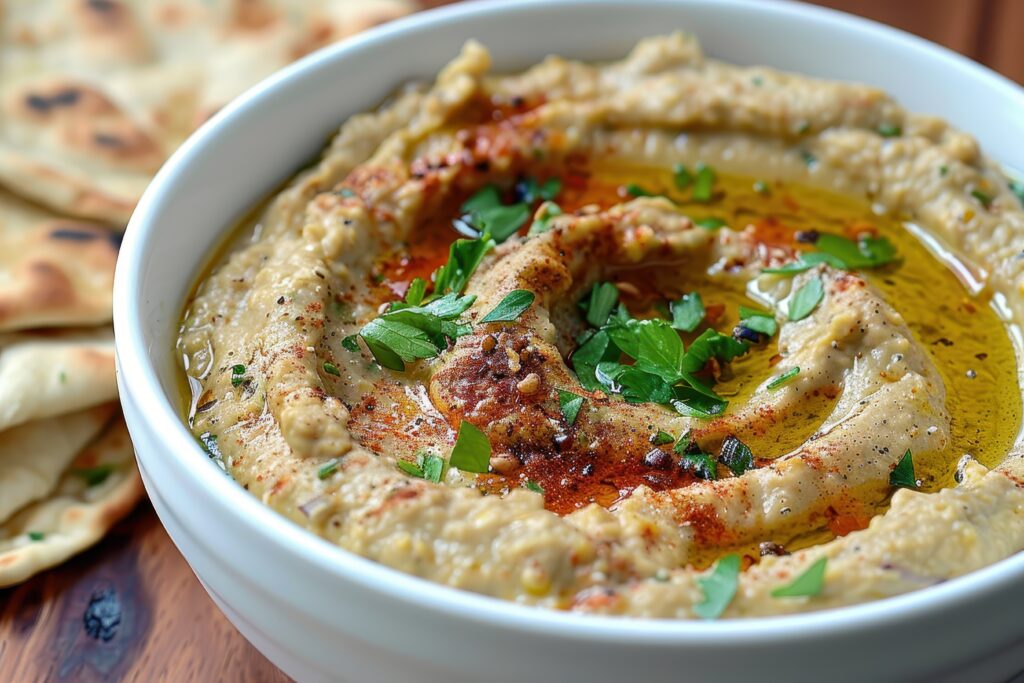
Baba Ganoush: The Smoky Delight of Middle Eastern Cuisine
Baba Ganoush, a smoky and creamy eggplant-based dip, is a cherished gem of Middle Eastern cuisine. Known for its rich flavour and silky texture, It has captivated taste buds worldwide. Chef Abdul, an expert in Middle Eastern flavours, shares the story, uses, and art of preparing this iconic dish. With its unique taste and health benefits, Baba Ganoush is more than just food; it celebrates simplicity and authenticity.
The Origins of Baba Ganoush
The name “Baba Ganoush” derives from Arabic, with “baba” meaning father and “ganoush” translating to pampered or indulged. Legend has it that the dish was created by a loving daughter for her indulgent father, making it a dish rooted in familial love and care.
Baba Ganoush hails from the Levant region, including modern-day Lebanon, Syria, and Palestine. Its key ingredient, eggplant, has been a staple in Middle Eastern cooking for centuries due to its versatility and ability to absorb flavours. Over time, the dish evolved into tahini, garlic, lemon juice, and olive oil, creating a perfect balance of smoky, nutty, and tangy flavours.
Uses of Baba Ganoush
- As a Dip: It is traditionally served with pita bread, flatbreads, or fresh vegetables such as carrots, cucumbers, and celery.
- As a Spread: It is a delightful addition to sandwiches and wraps, lending a smoky depth to the flavours.
- As a Side Dish, it can be Paired with grilled meats, kebabs, or falafel to complement and enhance the meal.
- As a Salad Base: This creative alternative to salad dressings adds creaminess and a burst of flavour to fresh greens.
- In Fusion Cuisine: Used in dishes like pasta or rice bowls for a Middle Eastern twist.
Chef Abdul notes, “Baba Ganoush is a humble and versatile dish. It pairs beautifully with almost anything, making it a must-have on any table.”
Storing Baba Ganoush
Baba Ganoush can be stored in an airtight container in the refrigerator for up to five days. Drizzle olive oil over the surface to preserve freshness before sealing the container. Freezing is possible, but the texture may change slightly upon thawing. Chef Abdul recommends making it fresh for the best flavour.
Ingredients
- 2 large eggplants (approximately 500 grams each)
- 60 grams tahini
- 2 tablespoons fresh lemon juice
- 2 tablespoons olive oil (plus extra for garnish)
- 2 cloves garlic, minced
- Salt to taste
- Optional: Paprika, parsley, or pomegranate seeds for garnish
Method:
- Preheat your oven or grill. Pierce the eggplants with a fork and roast them over an open flame, grill, or in the oven until the skin is charred and the flesh is tender (about 30-40 minutes).
- Allow the eggplants to cool, then peel off the charred skin and discard it. Place the flesh in a colander to drain excess liquid.
- In a mixing bowl, mash the eggplant flesh with a fork or potato masher for a chunky texture or blend for a smoother consistency.
- Add tahini, garlic, lemon juice, olive oil, and salt to the eggplant. Mix until well combined.
- Taste and adjust seasoning as needed. Transfer to a serving dish, drizzle with olive oil, and garnish with paprika, parsley, or pomegranate seeds of your choice.
“The secret to a great Baba Ganoush lies in achieving the perfect smoky flavour. Don’t rush the roasting process,” advises Chef Abdul.
Health Benefits of Baba Ganoush
- Rich in Nutrients: Eggplants are a good source of vitamins, minerals, and antioxidants.
- Heart-Healthy: The olive oil and tahini in Baba Ganoush contribute healthy fats that support cardiovascular health.
- Low in Calories: It’s a satisfying, guilt-free option for those watching their calorie intake.
- Digestive Health: Baba Ganoush is high in dietary fibre and supports a healthy digestive system.
Famous Indian Restaurants Serving Baba Ganoush
- Bayroute, Mumbai: Offers a luxurious Middle Eastern dining experience, with Baba Ganoush as a highlight.
- Zizo, Delhi: Renowned for authentic Lebanese dishes, including a smoky Baba Ganoush.
- Habibi Falafel, Bangalore: A casual eatery serving Baba Ganoush alongside falafel and other Middle Eastern staples.
- Sufra, Hyderabad: Features a menu rich in Levantine cuisine, with Baba Ganoush as a star dish.
- The Lebanese Point, Chennai: Celebrated for its vibrant mezze platters featuring creamy Baba Ganoush.
Conclusion
Baba Ganoush is more than just a dip; it’s a culinary expression of Middle Eastern culture and hospitality. Chef Abdul’s passion for this dish shines through his carefully curated recipe and insights. Whether you enjoy it as a dip, spread, or side dish, Baba Ganoush brings a smoky, rich flavour to your table.
Chef Abdul eloquently says, “Baba Ganoush is the art of turning humble ingredients into something extraordinary. It’s a dish that speaks of tradition, creativity, and love for good food.”

